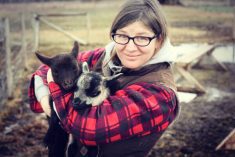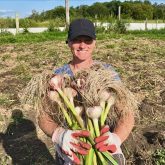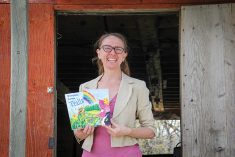Fiona Jochum has the weight of her first crop on her shoulders, and thus far it’s been a doozy.
Flea beetles, cutworms and dry conditions have hampered growth in her fields, but Fiona, 25, doesn’t let it get her down.
“Even though these things stress me out, I still love it. I still want to wake up every morning and go out and farm,” she said.
Last fall, Fiona took over some of the management of her family’s 3,200-acre grain and oilseed farm near St. Francois Xavier. She works alongside her dad, Gunter Jochum, president of the Western Canadian Wheat Growers Association.
Read Also

What I learned about Manitoba eggs
Manitoba-laid eggs provide good, locally produced nutrition while supporting local farmers and the Canadian agriculture industry.
Looking for opportunity
The Jochums’ Blue Diamond Farm got its start in 1980, when Fiona’s grandfather emigrated from Germany. He was looking for more opportunity for himself and his son and daughter, who both were interested in farming.
Fiona’s aunt later married a neighbouring farmer, and the two families got along so well that they began to share equipment and labour. Now, though separate businesses, they share resources and work each other’s land.
Fiona wasn’t much for farming as a child. “It was more just coming for tractor rides with Dad or bringing meals out to the field,” she said.
She helped on the family’s U-pick strawberry farm, and enjoyed working with the plants and customers until, in 2011, the strawberries were flooded out.
“I know some people, they’re born knowing that they want to be a farmer, but I wasn’t one of those people. I was kind of hemming and hawing,” Fiona said. “I loved the life growing up on the farm. I wasn’t sure that was something I wanted to get into.”
She decided to get her agriculture diploma at the University of Manitoba, and ended up loving the program so much that she stayed on and got her degree in agribusiness.
Fast-forward a few years and a few agriculture-related jobs.
“All the while I was doing that, I would usually sneak back in my free time to help out on the farm,” Fiona said. She began to wish she could return.
“I felt like I wanted to do it now while my dad is still here on the farm,” she said. When one of her dad’s hired workers quit, Fiona jumped at the chance to fill in.
Assistant manager
Fiona calls herself a sort of “assistant manager,” but jokes she’s also the public relations manager. During events like Open Farm Day, she’s the one who arranges the tours.
Along with her other duties, Fiona manages the farm data collection technology and does most of the scouting. She said she puts immense pressure on herself, and has had to learn to go easy on herself for not being an expert.
“I have to remind myself, you know, don’t get down. This is a learning process,” she said.
The pressure is exacerbated by the dry weather and poor crop prices, Fiona said. “I need to learn how to farm, and now Mother Nature’s going to be against me and the markets are going to be against me.”
Still, she acknowledges she’s had far more support than she expected. When she goes to the local ag retailer, Fiona said other farmers always stop to say ‘hi’ and ask how things are going. They seem happy and impressed that she’s come back to the farm.
“If I’m ever having a down day, that makes me feel better,” she said.
The future
Fiona works alongside her dad and uncle. Two of her three sisters also studied agriculture, and her uncle’s two daughters also studied ag.
“I like working with my family. I probably wouldn’t say that every day, but… ” Fiona laughed.
She said she’s not big on planning for the future. It’s hard to know how a farm, run by so many families, will get passed down to the next generation.
“The goal is to farm,” she said — adding that this could mean the family farm, or farming with a partner later in life.
“I would love to see this farm continue on into the future, into the next generation. I would say that’s my goal, but it’s not set in stone.”




















